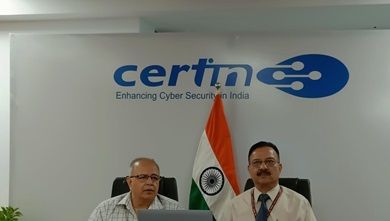The centre has exempted the Indian Computer Emergency Response Team (CERT-In), the national nodal agency to deal with cyber security threats like hacking and phishing, from the purview of the Right to Information Act, 2005. A notification of this effect was issued by the Department of Personnel and Training (DoPT) recently.
The Centre has used its powers given under sub-section (2) of Section 24 of the RTI Act to exempt CERT-In from the purview of the transparency law. Using those powers, the Centre has included CERT-In at serial number 27 in the Second Schedule of the RTI Act.
The CERT-In comes under the Ministry of Electronics and Information Technology. In March this year, Minister of State for Electronics and Information Technology Rajeev Chandrasekhar had informed Rajya Sabha that the “procedure of inter-departmental consultation” was on to discuss exemption of the CERT-In from the RTI Act.
“The Right to Information Act, 2005 is administered by the Department of Personnel and Training, which has apprised that a proposal of the Ministry of Electronics and Information Technology for exemption of the Indian Computer Emergency Response Team (CERT-In) from the said Act by way of inclusion of CERT-In in the Second Schedule to the Act, was received and the procedure of inter-departmental consultation, including with the Ministry of Law and Justice was undertaken in respect of the same,” Chandrasekhar said in written reply to a question asked by BJD member Amar Patnaik.
With inclusion in the Second Schedule of the RTI Act, the CERT-In now joins the list of 26 other intelligence and security organisations, which are already exempted from the purview of the Act.
These 26 intelligence and security organisations are: Intelligence Bureau; Research and Analysis Wing including its technical wing namely, the Aviation Research Centre of the Cabinet Secretariat; Directorate of Revenue Intelligence; Central Economic Intelligence Bureau; Directorate of Enforcement; Narcotics Control Bureau; Special Frontier Force; Border Security Force; Central Reserve Police Force; Indo-Tibetan Border Police; Central Industrial Security Force; National Security Guards; Assam Rifles; Sashtra Seema Bal; Directorate General of Income-tax (Investigation); National Technical Research Organisation; Financial Intelligence Unit, India; Special Protection Group; Defence Research and Development Organisation; Border Road Development Board; National Security Council Secretariat; Central Bureau of Investigation; National investigation Agency; National Intelligence Grid; and Strategic Forces Command.
The RTI law empowers the Central Government to amend the Second Schedule by including therein any other intelligence or security organisation established by it or omitting therefrom any organisation already specified therein. The Centre can amend the Second Schedule through a notification in the Official Gazette. However, every such notification shall be laid before each House of Parliament. Similar powers have been given to the state government under Sub-section 4 of Section 24 of the RTI Act.








